Related Research Articles

Roman Britain is the period in classical antiquity when large parts of the island of Great Britain were under occupation by the Roman Empire. The occupation lasted from AD 43 to AD 410. During that time, the territory conquered was raised to the status of a Roman province.
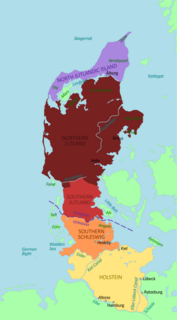
The Jutes, Iuti, or Iutæ were one of the Anglo-Saxon tribes who settled in England after the departure of the Romans. According to Bede, they were one of the three most powerful Germanic nations.

The Picts were a group of Celtic-speaking peoples who lived in what is today eastern and northern Scotland during Late Antiquity and the Early Middle Ages. Where they lived and what their culture was like can be inferred from early medieval texts and Pictish stones. Their Latin name, Picti, appears in written records from Late Antiquity to the 10th century. They lived to the north of the rivers Forth and Clyde. Early medieval sources report the existence of a distinct Pictish language, which today is believed to have been an Insular Celtic language, closely related to the Brittonic spoken by the Britons who lived to the south.

Flavius Odoacer, also spelled Odovacer or Odovacar, was a soldier and statesman of barbarian background, who deposed the child emperor Romulus Augustulus and became King of Italy (476–493). Odoacer's deposition of Romulus Augustulus is traditionally seen as marking the end of the Western Roman Empire as well as Ancient Rome.

The Roman conquest of Britain was a gradual process, beginning in AD 43 under Emperor Claudius and being largely completed by 87 when the Stanegate was established as the northern frontier.
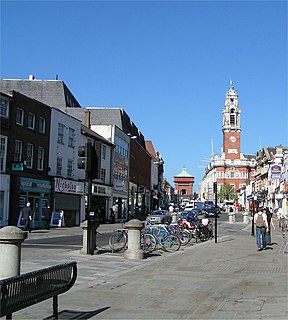
Colchester is a historic market town and the largest settlement within the borough of Colchester in the county of Essex. Colchester occupies the site of what was Camulodunum, the first major Roman city in, and sometime capital of, Roman Britain. Colchester lays claim to be regarded as Britain's oldest recorded town.
The Battle of the Medway took place in 43 AD, probably on the River Medway in the lands of the Iron Age tribe of the Cantiaci, now the English county of Kent. Other locations for the battle have been suggested but are less likely. This was an early battle in the Claudian invasion of Britain, led by Aulus Plautius.

Robin George Collingwood was an English philosopher, historian and archaeologist. He is best known for his philosophical works, including The Principles of Art (1938) and the posthumously published The Idea of History (1946).

In historiography, ancient Rome is Roman civilization from the founding of the Italian city of Rome in the 8th century BC to the collapse of the Western Roman Empire in the 5th century AD, encompassing the Roman Kingdom, Roman Republic and Roman Empire until the fall of the western empire. The civilisation began as an Italic settlement in the Italian Peninsula, traditionally dated to 753 BC, that grew into the city of Rome and which subsequently gave its name to the empire over which it ruled and to the widespread civilisation the empire developed. The civilization was led and ruled by the Romans, alternately considered an ethnic group or a nationality. The Roman Empire expanded to become one of the largest empires in the ancient world, still ruled from the city, with an estimated 50 to 90 million inhabitants and covering 5 million square kilometres at its height in AD 117.

The Caledonians or the Caledonian Confederacy were a Brittonic-speaking (Celtic) tribal confederacy in what is now Scotland during the Iron Age and Roman eras. The Greek form of the tribal name gave rise to the name Caledonia for their territory. The Caledonians were considered to be a group of Britons, but later, after the Roman conquest of the southern half of Britain, the northern inhabitants were distinguished as Picts, thought to be a related people who would have also spoken a Brittonic language. The Caledonian Britons were thus enemies of the Roman Empire, which was the occupying force then administering most of Great Britain as the Roman province of Britannia.

Eboracum was a fort and later a city in the Roman province of Britannia. In its prime it was the largest town in northern Britain and a provincial capital. The site remained occupied after the decline of the Western Roman Empire and ultimately evolved into the present-day city York, occupying the same site in North Yorkshire, England.

The Dominate is the name sometimes given to the "despotic" later phase of imperial government, following the earlier period known as the "Principate", in the ancient Roman Empire. This phase is more often called the Tetrarchy at least until 313 when the empire was reunited.
John Nowell Linton Myres was a British archaeologist and Bodley's Librarian at the Bodleian Library in Oxford from 1948 until his resignation in 1965; and librarian of Christ Church before his Bodleian appointment.
Peter Salway, FSA is a British historian, who specialises in Roman Britain. He lectured at the universities of Durham, Cambridge, Bristol and Oxford, before becoming Professor of the History and Archaeology of Roman Britain at the Open University.
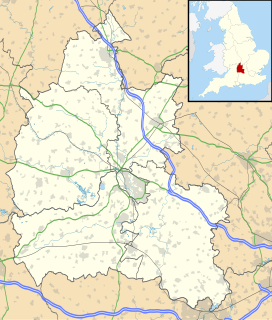
Alchester is the site of an ancient Roman town. The site is not included in any ancient references so the Roman name is not known. However, Eilert Ekwall contended that it appears as Alavna in the Ravenna Cosmography, with the addition of the Old English ceaster to signify a Roman fort. It lies about 2 miles (3 km) south of Bicester, in the northwest corner of the civil parish of Wendlebury in the English county of Oxfordshire.
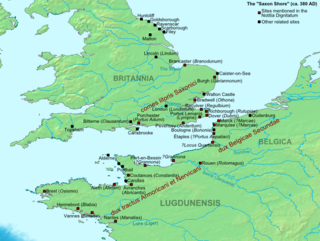
The Saxon Shore was a military command of the late Roman Empire, consisting of a series of fortifications on both sides of the English Channel. It was established in the late 3rd century and was led by the "Count of the Saxon Shore". In the late 4th century, his functions were limited to Britain, while the fortifications in Gaul were established as separate commands. Several Saxon Shore forts survive in east and south-east England.
British Latin or British Vulgar Latin was the Vulgar Latin spoken in Great Britain in the Roman and sub-Roman periods. While Britain formed part of the Roman Empire, Latin became the principal language of the elite, especially in the more Romanised south and east of the island. However, in the less Romanised north and west it never substantially replaced the Brittonic language of the indigenous Britons. In recent years, scholars have debated the extent to which British Latin was distinguishable from its continental counterparts, which developed into the Romance languages.
Meonwara or Meonsæte is the name of a people who controlled a territory in south-east Hampshire, focused on the Meon valley, during the late 5th and early 6th centuries. Meonwara means "People of the Meon" in Old English.

The Dux Belgicae secundae was a senior officer in the army of the Late Roman Empire who was the commander of the limitanei and of a naval squadron on the so-called Saxon Shore in Gaul.
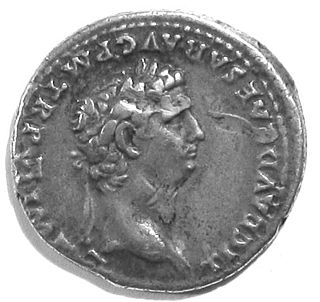
The frontier of the Roman Empire in Britain is sometimes styled Limes Britannicus by authors for the boundaries, including fortifications and defensive ramparts, that were built to protect Roman Britain. These defences existed from the 1st to the 5th centuries AD and ran through the territory of present-day England, Scotland and Wales.
References
- ↑ Joan P. Alcock (26 May 2011). A Brief History of Roman Britain. Little, Brown Book Group. p. 95. ISBN 978-1-84901-813-5.
- ↑ R. G. Collingwood; Robin George Collingwood; John Nowell Linton Myres (February 1936). Roman Britain and the English Settlements. Biblo & Tannen Publishers. p. 284. ISBN 978-0-8196-1160-4.
- ↑ Peter Salway (31 May 2001). A History of Roman Britain. OUP Oxford. p. 281. ISBN 978-0-19-280138-8.